Gamebox 2.0: Games of April 2022
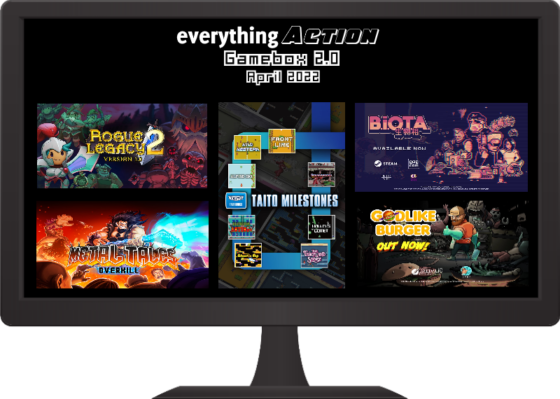
While we got in a ton of gaming at the end of April at PAX East 2022 (which we’ll have a trip report on soon), we squeezed in more game time with a few new releases. We got to try our hands on the highly anticipated Rogue Legacy 2, went old school with Taito arcade classics, flipped burgers in space in Godlike Burger. and more. Check out everything we got to play below in the Gamebox.
Rogue Legacy 2 (Zach): In Early Access since August of 2020, Rogue Legacy 2 is finally out in a full, version 1.0 release on Steam and Xbox. The sequel to the excellent rogue-like Rogue Legacy, Rogue Legacy 2 takes everything that was great about the first game and keeps it while adding tons of new ideas and mechanics to the mix. The game still has the mechanic where, when you die, you choose an heir to continue your quest but the heirs all have different classes and genetic traits. The traits vary wildly from colorblindness to being a “diva” that causes your character to be caught in a spotlight with the rest of the screen black or “nostalgic” which makes the game sepia-toned and the music changes to match. There are a ton of classes to unlock, each of them bringing a new way of playing the game and new abilities to use and combat is simple but satisfying, and you are sure to find a class that matches your playstyle (Valkryie for me was my favorite of the ones I’ve seen so far) There seem to be a lot more movement options as well in this version, including a dash that lets you pass across obstacles and dodge attacks and a spin attack that lets you bounce off enemies and certain obstacles to reach upper areas of the map or just pogo on top of enemies’ heads to kill them. There are also teleporters that are used in some puzzle-type trap rooms and it feels like Cellar Door Games took some queues from games like Guacamelee to really up the way you can navigate around the world of Rogue Legacy 2.
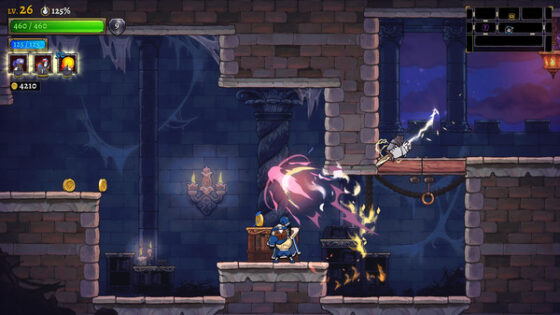
There are so many choices about where you can go on the map and there are tons of special items to find, challenges to conquer, and bosses to fight. You can find new items called Heirlooms that, if you complete the challenge associated with them, give you a permanent upgrade that transfers to subsequent generations, and the further you make it into the game, the more gold you collect, which you can use to build up your own fortress, adding vendors to create items for you, unlock new classes and upgrade your health, mana, weapon strength and more. You’re encouraged to spend as much gold as you can before each run because Charon, who transports you into the main game, takes all the gold you have left. Each run is randomized and add that to the traits and classes you could have with your current heir, nobody’s run will ever be the same. The game also looks fantastic with a completely new art style that gives a ton of personality to your character and the enemies and the levels look great with lots of lighting effects and background elements to add to the atmosphere. In its full 1.0 release, Rogue Legacy 2 is a fantastic sequel that will surely satisfy fans of the first game while adding tons of excellent additions to control, combat, and exploration that take everything to the next level. If you’re a fan of rogue-likes, this is a must-play.
Godlike Burger (Chris): Serving up a killer burger takes good ingredients and proper cooking, but sometimes there is a secret element that will make customers crave that special burger taste. Turns out customers love the taste of themselves in Liquid Pug and Daedalic Entertainment’s Godlike Burger, a galactic cooking sim that lets your harvest and service consumers in an extreme way. You take up the role of unnamed and very unlucky cook & restaurant manager who must operate the Good Burger, a traveling burger restaurant ship looking for hungry customers across the galaxy. The player has to manage the supplies, resources, and bill management, as well as keep the popularity of the restaurant and sinister business under wraps. But it’s tough in the food industry, there are some pitfalls and deadly setbacks that will kill the burger shop and even the cook. Fortunately, death can’t keep a good burger from staying down.
The gameplay of Godlike Burger combines simplified cooking mechanics with roguelike elements that slowly add permanent buffs to the player. The player has to cook personalized burgers with different types of meats, toppings, and a bun. The meat cooks on a stove that slowly fills up a progress bar to resents when the meat is “done” but if not attended to, can start to overcook and burn. Customers will request a variety of toppings to form their burgers and based on their satisfaction with the meal, will give a certain tip amount if the player got their order right. The money will help resupply toppings, purchase upgrades around the place, and pay off some of the daily expenses to operate the restaurant. However, meat isn’t easy to come by in the dark depths of space and Good Burger has a terrible issue with its health code.
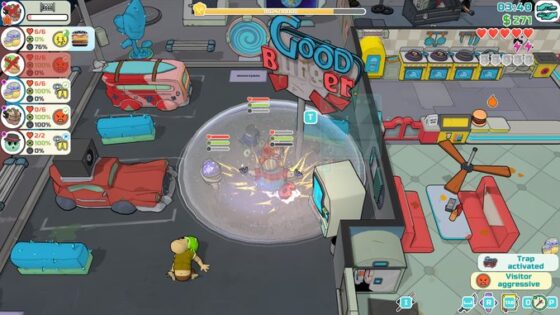
All of the meat comes from various visitors that just happen to die on the premise and are now unknowingly menu items. Certain alien races have a taste for certain meat that only comes from other aliens. But like humans, no one wants to know how exactly the meat becomes burgers. The player has to quietly kill off a few of the customers in order to resupply the meat. This comes in the forms of traps, poisons, and a direct cleaver swing. Dead bodies have to be disposed of and can leave a bloody stain on the player. The player has to wash off their gruesome murder and hopefully not get caught. All of these can be upgraded and dramatically change how the player can easily collect the meat. But going on a murder spree isn’t good for getting more customers in the door of Good Burger. Killing customers before they paid will hurt potential sales. Some aliens are immune to certain attacks and will be aggressive if they suspect the cook has evil intentions. Also being a sloppy killer has consequences too. Leave too many witnesses alive and they will report Good Burger to the police, eventually bringing the cops to raid the restaurant.
If the player gets into a tight spot and happens to get space frontier justice, that’s okay. Death will bring everything back to the start and let the player try again. Resetting puts the player back at day one with all the progression back to the beginning and their budget back to nothing. But if the player spent the right amount of cash, it’ll be easier the next time. All the upgraded equipment, skills, and buffs are permanently unlocked, but they come at steep initial prices from the start. It takes a few rounds to understand how the game flows and hopefully the new players will purchase a few things along the way. There is a small but critical feature that lets the player bank some of their money in a safe after the completion of each day. This is vital to ensure that they can purchase stuff again in case they are killed, which will happen a lot. But it is easy to gamble on raking in money for a day and losing it all to funny mistakes.
Overall, Godlike Burger is great addictive gameplay and a fun progression element that make the player feel like they are improving while ramping up the challenges. The gameplay is mechanically simple but offers a ton of chaotic moments to carefully juggle cooking and killing to hopefully reach the end of a day. It never feels like you are too powerful or in control, all it takes is one small misstep and the restaurant goes from a 5-star dining experience to a house of horrors. I found myself sinking a few hours into trying to earn better profits each day, trying to find a way to make big bucks while hoarding tons of alien meat. There are a variety of approaches to how you want to manage the restaurant and give in to your inner Jigsaw trap killer. Sometimes it’s profitable to make burger order and earn prestige, while at times it’s better to kill off a customer that will leave a bad review. On the occasion, there will be panic and messy killings because a trap is triggered too soon and there are too many witnesses around. In times like that, when the plan goes wrong, Godlike Burger will see how well the player can manage things. Godlike Burger was released on April 21 for Steam.
Metal Tales Overkill (Zach): Coming from Zerouno Games, Metal Tales Overkill is a rogue-like shooter that finds you battling against corrupted Metal Gods, who have been taken over by the evil god Kuk. The corrupted Metal Gods are infecting their Metalhead fans and spreading an evil form of Metal across the land. You have to venture across different concert venues, battle the Metal Gods and stop Kuk from taking over the world. The game plays from a top-down perspective with a twin-stick setup where you use the left stick to move and the right stick to aim. You shoot out metal energy from your guitar and you have to fight your way through different rooms. As you progress, you’ll find rooms with special power-ups, trap rooms that hide a powerful item if completed and stores to buy items and power-ups.
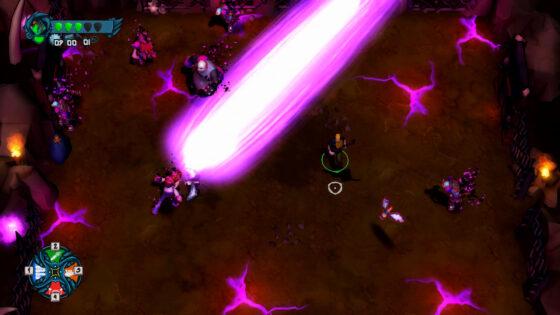
There are three different venues to battle through with 6 levels each, culminating in a battle through Hell itself. The levels are all procedurally generated, so when you die, your next run will be completely different, which includes the bosses as you could face any of the bosses in any of the levels. You can enlist a friend and play local co-op and headbang together to the game’s awesome soundtrack, which is obviously full of shredding guitars from real-life Metal bands, and each boss has their own unique song. Growing up with the likes of Smash TV, the action of Metal Tales feels a little slow but there’s also not the massive hordes of enemies, which balances things out. Your rate of fire is a bit slower than you might expect if you played other similar games, which makes you have to aim a bit more deliberately as you can rely on a stream of bullets to be flying at your enemies. The game has a pretty cool comic book style to its art and it’s suitably dark and metal to match the story and music. Metal Tales Overkill isn’t going to redefine the top-down shooter/roguelike genre but it’s a solid entry and if you’re a fan of metal music and looking for something new to play, you can check it out on PC, PS4/5, Switch, and Xbox Series X/S.
B.I.O.T.A (Zach): Coming from small bros and Retrovibe, B.I.O.T.A. is a Metroidvania that plays up its retro throwback vibes. Playing as a squad of soldiers sent to investigate an outbreak of biological monsters at a remote mining facility off-world, BIOTA is an old school platformer with Metroidvania hooks like a map that builds out as you explore and items to find that permanently increase your arsenal and abilities. The game has a sort of Super Meat Boy vibe to the controls, as your character sprite is on the small side but you can do things like wall climb and jump between walls to ascend. There are both a variety of nasty alien enemies to take on as well as environmental obstacles like pits and flaming vents to avoid and you have to utilize all your movement options to navigate the levels.
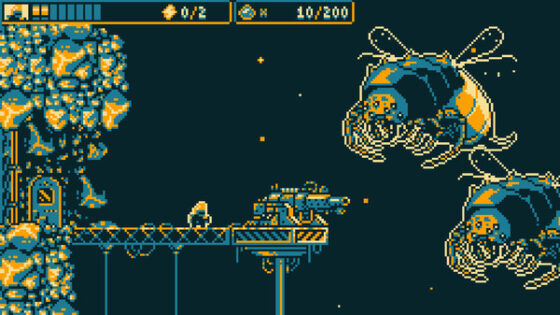
One of the most fun aspects of the game is the various color palette you can apply that can let you replicate things like old CGA graphics, Game Boy, and more. There are tons to choose from and you can even find and unlock more as you play the game and the game’s music has that old-school vibe as well but with modern sensibilities too. Despite the old school coloring, the pixel art is fantastic and you’ll find lots of interesting areas to explore and huge, intricate bosses to battle. The gameplay is also super smooth and modern and as you play, you unlock new members of your team that you can switch between at will, with each one having different weapons and abilities, which is part of the Metroidvania gameplay loop. BIOTA is a fun, fast-paced platformer that is definitely worth checking out if you’re a fan of old-school visuals and Metroidvania-style exploration. It’s out now on PC.
Taito Milestones (Chris and Zach): Taito and ININ Games present a collection of ten groundbreaking titles that revolutionized the arcade. Taito Milestones gathers the best games from Taito’s past, each represents a different genre and style of gaming that got players pumping quarters into machines. Below are some quick recaps of the featured games.
- Qix – This puzzle title was an unbelievable hit in 1981 that played like no other puzzler. There are no matching or swapping pieces involved but is based on quick decision-making and faster controls. The object of the game is to outline and take over the screen while avoiding collisions with enemies and the Qix, the flying collection of sticks that free bounces around. The player has to make connecting lines to form rectangle-like shapes in order to “capture” a part of the screen. The player can move with a Slow Draw and a Fast Draw, each moves at different speeds and scores different points. Slow Draw is used for moving distances that are considered the safest, and Fast Draw should be used in small gaps to take up space. Qix’s gameplay still upholds even all these years and is an actual rare machine to see, so this title is well worth a play.
- Space Seeker – Part FPS, part shoot’em up, Space Seeker had some innovative designs at the time. The player is tasked with defeating alien invaders and can approach battle in one of two ways. If the player encounters a fleet of ships, the game enters a first-person perspective dog fight. This mode has vertical controls that you shoot enemies and their incoming missiles, and it mimics some rough space flying. If the player encounters a base, the game becomes a traditional scrolling horizontal shooter with the goal to reach the end of the level. The shooting mechanics are dated, but are important to game history as many others later will take inspiration.
- Alpine Ski– A simple ski title that lets the player rack up points as they move down a hill. There are points that must be skied over to score that are placed in tight and tricky spots but are not too difficult to get with some practice. There are rocks, trees, motor-sleds and other skiers to avoid on the trail, and a time limit to reach the bottom. At the end of every successful two runs, there is a bonus level to make a ski jump that adds some bonus points if the player makes a solid landing. This is a fun time-waster that feels like a flash game by today’s comparison, but definitely represents the simple charm of sports games of the early 80s.
- Front Line – This early precursor to the twin-stick shooter puts the player into the boots of a soldier taking on a whole army of enemy combatants. Armed with a pistol and a grenade, the player has to move vertically up the screen, and navigate thru trees and open fields while battling other soldiers and tanks. Occasionally, there are tanks to commandeer and use in the fight. The goal of each level is to reach the end boss and make them surrender. Front Line shooting mechanics feel a bit rough and doesn’t have the exact punch as most run and game titles. The shooting takes time to get used to as you must slowly rotate the gun around the player. This game works well to entice gaming historians than casual gamers.
- Wild Western – Another precursor to the run and gun genre, Wild Western puts the player as the role of a horse riding sheriff that must protect a train from bandits. The sheriff has to avoid obstacles, bullets, and letting three bandits board and take over the train. Wild Western has the same shooting mechanics as Front Lines but plays also like a vertical shooter with its on rails moving mechanics. It’s a rough shooting game that can be a fun try for a few minutes.
- Chack’n Pop – This platform puzzle title features Chack’n, a yellow wall-crawling and bomb tossing creature that is on a mission to reclaim his lost hearts. The player controls Chack’n by moving him around the floors and hopping his position onto the ceilings. Chack’n can’t jump and must flip over to overcome gaps. Scattered thru the level are eggs that hatch Monstas, which will seek out Chack’n. They can be destroyed with bombs that spread out in a cloud, but can also harm Chark’n if caught in the blast. While not the most accessible action-puzzler Chack’n Pop has charming character designs and sound effects. The awkward controls and tricky navigations make the game difficult to play. Chack’n Pop has appeal more to arcade buffs than casual gamers.
- Elevator Action-This action platformer puts the player in the role of a spy sneaking into a building to grab a secret file. The player must take out guards with his gun and avoid bullets by ducking or using a well-timed jump. The player will have to carefully use elevators and escalators to travel downward in the building to find the red doors containing the secret files. Once they have the file, it will be a dash to reach the bottom level of the build and make it to the garage. Elevator Action has fun action mechanics that still hold up and has great arcade replayability.
- The Fairyland Story – This platformer puts the player in control of Ptolemy, a witch that uses her magical powers to turn enemies into cakes. Ptolemy is on a mission to clear out enemies in those strongholds and restore peace in her kingdom. The Fairyland Story has a very simple mechanic of turning enemies into cakes that can be dropped off ledges and onto enemies for bonus points. The game is pretty straightforward and has 101 levels to complete. The Fairyland Story is fun but repetitive and will be a test of patients than skill after the first twenty levels.
- Halley’s Comet – This vertical shoot’em up task the player with defending the solar system from aliens. Two unique mechanics of the game is showing the distance the player is traveling and the consequences of missed enemy ships. Enemies that manage to pass the player will damage the defended planet, and if 100% damaged the game is over. Halley’s Comet has timeless shoot-em action that doesn’t become overwhelming. The levels don’t feel very long and the game’s consequence of missed ships plays a role in taking down enemies on screen.
- The Ninjawarriors – This side-scrolling beat’em up puts the player into the role of a ninja android, set on a mission to stop a corrupt USA president. This classic arcade game has similar mechanics to Kung Fu or Rush’n Attack as all the action takes place in a 2D plane and enemies spawn and run at the player. The player takes on waves of enemies to reach the level’s boss, piling the body count along the way. This is a perfect emulation of the arcade classic but still does not top seeing the original arcade cab in all of its three TV screen glory.
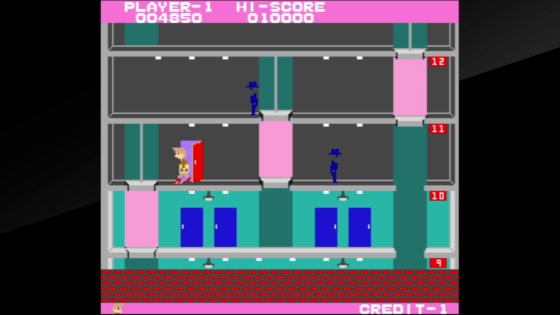
Like many arcade classics, it sounds easy on paper, but once you are wrapped up in it, the game is a real challenge once you go for high scores and perfect runs. If you haven’t gotten any of these games yet and are interested in some classic arcade hits, Taito Milestones is worth checking out and Qix, Elevator Action, The Ninja Warriors, Halley’s Comet and The Fairyland Story are still fun to play and experience and the rest of the collection is interesting historical items that don’t really hold up but did introduce some sort of new gameplay style or innovation to the medium. If the collection was nothing but classic bangers, it would be a no-brainer but maybe check out some gameplay of all the games in the collection first before you decide if you want to grab the whole thing or maybe just grab just the 3 or 4 unimpeachable classics by themselves. These are fun titles to pick up and play on the switch and are ideal for gamers that are in the mood for some classic arcade fun. Taito Milestones was released on the Nintendo Switch on April 15.



